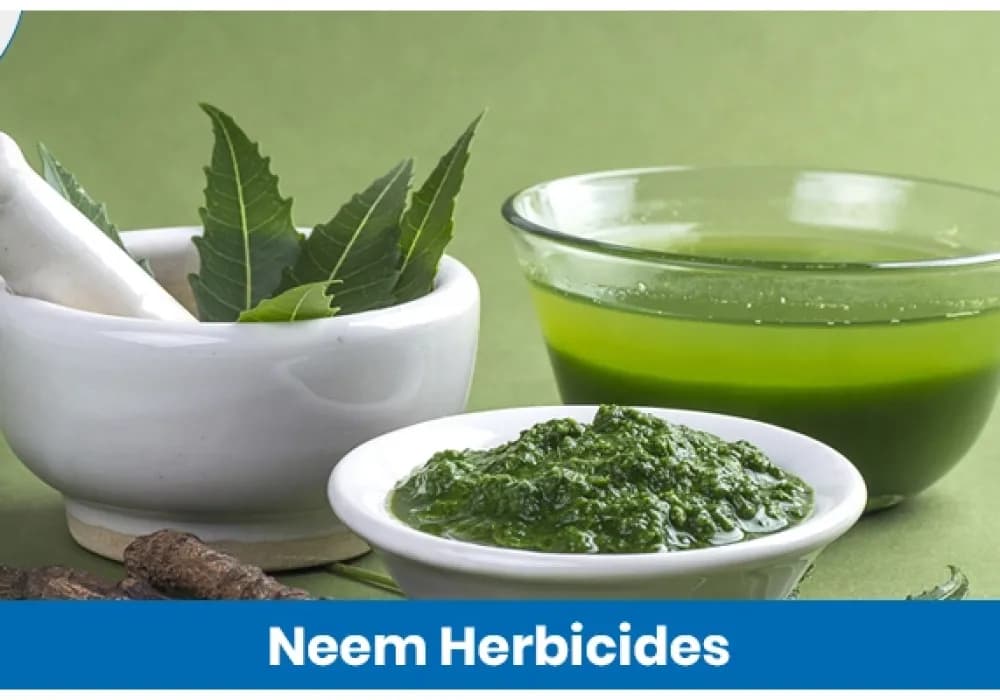Every season, farmers wage a tough battle against weeds. These unwanted plants consume nutrients, water, and sunlight, thereby reducing yields and increasing costs. Here, chemical herbicides may act quickly, but they often leave behind harmful residues and slowly damage your soil.
This is where neem herbicide makes a difference. It provides farmers with a natural, safe, and sustainable method for controlling weeds while maintaining soil health. Its seeds, leaves, and oil have natural compounds that are effective against a wide range of weeds, pests, and fungal diseases, which damage crop quality, growth, leading to loss in farming.
Since neem trees offer numerous benefits, many farmers are now opting for neem herbicide as an eco-friendly alternative, thereby avoiding the adverse effects of chemical-based weed killers.
However, as a completely natural solution, neem herbicides also come with concerns about soil health and long-term sustainability. Do they work well? Can we completely adapt to neem-based solutions in farming? How effective is neem compared to the chemical-based alternatives? We will answer all your questions in this blog.
How Neem Herbicides Work on Weeds?
As germination inhibitors, liminoid compounds in neem prevent weed seeds from sprouting. This reduces the growth of new weeds, and for growth disruption, the biochemical action inside the weed plants slows down in young weeds. This results in their stunted growth.
For soil conditioning, neem extracts and neem cakes improve soil health, creating favorable conditions for crop growth while suppressing weed plants. As opposed to harsh chemical herbicides, any variant of neem herbicide for organic farming does not destroy all vegetation instantly. It gradually suppresses the weeds, making them weak from the inside. Hence, the crops have a competitive advantage over weeds, without any harmful residues.
“Neem-based crop protection options are effective across many Indian crops.ICAR research on neem herbicides, reported a successful usage of neem cake.”
What are the Benefits of Neem Herbicides in Agriculture?
Neem herbicides are completely eco-friendly, which also makes them an ideal choice for sustainable farming and organic farming.
They provide long-term benefits, such as improved soil health and fertility, and ensure residue-free crop production, which is ideal for organic farming.
Not only that, but they are also versatile and applicable to a variety of crops, providing long-lasting benefits at a reasonable cost. Here are some additional benefits of neem herbicides that you should know.
Eco-Friendly & Safe for Soil:
Neem herbicides are biodegradable in nature and safe for soil microbes, which contributes to soil fertility. They are also safe for beneficial farm insects and water-based organisms. Therefore, they are ideal for farming in eco-sensitive zones, as they offer protection to the surroundings, beneficial microorganisms, and healthy soil.
Residue-Free Crop Production
Using natural herbicides with neem ensures heightened safety for the harvested produce. It is a necessary factor for organic certification and markets that sell residue-free crops.
Improved Soil Fertility & Long-Term Yields
Various neem products can add organic matter to the soil, which improves microbial activity. Active microorganisms in the soil uplift the soil’s fertility over time. The dual benefits of neem, including weed control and soil nourishment, can lead to better long-term yields.
Cost-Effective & Multi-Purpose Use
At first, the neem-based products can seem slightly costlier. However, it offers multiple benefits, including pest suppression, soil improvement, and weed control. These benefits ultimately result in savings on fertilizer and other crop protection product costs throughout the season.
Neem herbicides can be effective for multiple crops, including vegetables, fruits, cereals, pulses, and plantation crops. You can use them in both open fields and closed farm setups.
When to Use Neem Herbicides (Based on Crops & Conditions)
Remember, neem-based weed control is not ideal for all situations.
Here are the crops and conditions that best suit the natural herbicides with neem:
Crops:
Cereals:
- Wheat
- Maize
- Rice
- Millet
These cereal fields can greatly benefit from the neem-based herbicides during the early growth stage of weeds.
Vegetables:
- Okra
- Tomato
- Cucumber
- Brinjal
These are some of the vegetable crops that can be protected by neem herbicides.
Plantations:
- Tea
- Coffee
- Sugarcane
You can use neem-based solutions for these plantations to keep weed pressure low without harming perennial crops.
Conditions:
Early Weed Stage:
Neem-based crop protection can be ensured when weeds are in their initial growth phase. This is the ideal time to use pre-emergent or bioherbicides to eliminate annoying and toxic weeds.
Organic Farms:
Organic products cannot have chemical usage. Hence, farms looking to avoid synthetic chemicals to maintain organic certification require accurate usage conditions.
Programs for Soil Enrichment:
Farms that want to improve the soil’s organic matter can benefit twice as much from neem herbicides, as it does not affect the soil quality and helps in growing healthy harvests.
In heavier weed outbreaks, neem herbicide can be combined with other mechanical or mulching methods for more effective control. In fact, Neem-based crop protection options are effective across many Indian crops.
ICAR research on neem herbicides reported the successful use of neem cake. The neem cake eradicated the parasitic plants by over 55% and improved the tobacco yield by nearly 20%.
These results show the neem’s dual role in suppressing weeds and improving crop performance. Furthermore, this makes neem herbicide solutions highly suitable for sensitive crops or location-specific sandy soils that have higher pest pressure.
Usage Guidelines and Precautions for Farmers
Using neem-based herbicides may require a different approach than chemical-based sprays. For best results, you should always consider these factors:
Correct and Precise Timing:
Application time matters the most. You should apply natural or neem-based herbicides during the early stages of weed growth for maximum effect, as the weed plants are tender at this time. Moreover, if you want the desired result, you can also repeat the application process to achieve the quality result.
Dosage:
High concentrations (overdosing) can harm sensitive crops. But underdosing may waste an entire spray drive. Therefore, follow the manufacturer’s recommendations correctly and thoroughly.
Method of Application:
Be mindful while spraying, spray evenly on weeds while also covering the surrounding soil. If you are using powder or neem cake, then you must mix them into the soil before planting.
Considering Weather Conditions:
You should avoid spraying during heavy rain as the applied neem herbicide may wash off. The best time for the application is early morning or late evening. This prevents wash off and rapid evaporation of the herbicide.
Safety Precautions & Guidelines:
Even for natural herbicides with neem, you should always wear gloves during application to avoid skin irritation and other topical issues. Additionally, keep neem-based products out of the reach of children and animals as a precaution. By following these guidelines, you can always protect your valuable commercial crop. A neem-based crop protection requires dedication, research, and awareness to reap its better benefits.
FAQs

K SANJEEVA REDDY
CHIEF AGRONOMY OFFICER
Sanjeeva Reddy K. serves as the Chief Agronomy Officer at AGRIBEGRI TRADELINK PVT LTD, a role he stepped into in July 2025, where he oversees and manages agronomy expertise across the organization. He holds a Postgraduate degree in Agricultural Science from Tamil Nadu Agricultural University, India, and is a Certified Crop Advisor accredited by the Indian Society of Agri Professionals, in association with the American Society of Agri Professionals. With more than 20 years of experience in crop production, Reddy has built extensive expertise working across reputed agribusiness industries. A significant part of his career includes a decade-long tenure with the internationally recognized Indian brand MULTIPLEX, a leading Bangalore-based manufacturer and marketer of plant nutrients, where he played a key role in driving growth and innovation.
